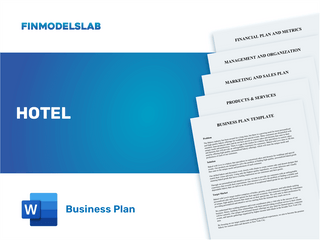
Hotel Business Plan
$59.00$39.00
INTERNAL FACTORS |
|
|---|---|
STRENGTHS + |
WEAKNESSES - |
|
|
EXTERNAL FACTORS |
|
OPPOPTUNITIES + |
THREATS - |
|
|
Introduction
The hotel industry is a highly competitive and constantly evolving landscape. With changing consumer preferences and growing expectations for personalized and unique experiences, boutique hotels have become increasingly popular. In this blog post, we will conduct a SWOT analysis for establishing a boutique hotel that specializes in providing custom experiences and luxurious accommodations. By assessing the strengths, weaknesses, opportunities, and threats of this business idea, we can identify key factors that can lead to its success and potential challenges that must be addressed. Let's dive in and explore the potential of this business venture.Strengths
- Luxurious amenities: By providing high-end amenities such as luxury spas, swimming pools, gourmet restaurants, and high-end entertainment venues, guests will experience a one-of-a-kind luxury stay.
- Custom experiences: Creating a unique and unforgettable stay for guests by offering bespoke experiences tailored to their preferences will make the hotel stand out from competitors.
- High-quality service: Utilizing technology and innovation to provide the highest quality of service will enhance the guest experience and set the hotel apart.
- Unique design elements: Incorporating unique design elements throughout the hotel, such as locally sourced materials or custom artwork, will add to the overall experience and make the hotel memorable.
- Personalized attention: By offering personalized attention to every guest, the hotel can create a loyal customer base and garner positive reviews and word-of-mouth recommendations.
|
Expert-built startup financial model templates
|
Weaknesses
- Limited target market: A boutique hotel's specialty may come at a high cost, which limits its reach only to the wealthy and affluent. This excludes potential guests who may be unable to afford the services.
- High maintenance costs: A boutique hotel requires a considerable investment in maintenance, restoration, and regular updates. The luxurious amenities, such as the spa, restaurants, and swimming pools, require constant upkeep and attention, which may be a significant expense.
- Subject to market trends: Guest preferences change with time, which means that boutique hotels need to adapt and adjust to the shifting market trends. Failure to adjust may lead to reduced bookings and declining revenue.
- Reliance on negative reviews: Negative reviews on online travel sites can affect boutique hotels more severely than branded hotels. Negative reviews lower the ratings, decreases revenue, and damage the hotel's reputation.
Opportunities
- Increase demand for unique experiences: With more people willing to pay for exclusive experiences, there is an opportunity to offer customized experiences that cater to individual tastes and preferences.
- Growing middle class: The rise of the middle class means more people with disposable income looking for luxurious accommodations and amenities.
- Higher spending per customer: Boutique hotels can charge a premium for their exclusive offerings, which translates to higher revenue per customer compared to traditional hotels.
- Use of technology: Technology and innovation can be used to enhance the guest experience, which can differentiate a boutique hotel from its competitors.
- Domestic and international tourism: With increasing numbers of domestic and international tourists, boutique hotels can tap into the growing demand for unique and luxurious accommodations.
Threats
- Competition: The hotel industry is highly competitive, with many established players and new entrants constantly entering the market. This can make it difficult for a boutique hotel to stand out and attract customers.
- Economic downturns: During periods of economic uncertainty, consumers may be less likely to travel and spend money on luxury accommodations, which could negatively impact the hotel's revenue.
- Natural disasters: Natural disasters like hurricanes or flooding could cause damage to the hotel's property and result in temporary closures or decreased occupancy rates.
- Changing consumer preferences: Customer preferences and expectations may change over time, and boutique hotels must adapt to these changes in order to remain competitive.
- Geopolitical events: Unforeseen geopolitical events, such as terrorist attacks or political unrest, could have a negative impact on the hotel's business by deterring travelers from visiting the area.
Conclusion
After conducting a SWOT analysis of the hotel business, it is clear that there are several strengths and opportunities that hotel owners can take advantage of. The increasing demand for travel, the growth of tourism, and the rise of the middle class provide an excellent opportunity for hoteliers to expand their businesses and attract more customers.
However, there are also several weaknesses and threats that hotel owners need to be aware of. The increasing competition, the rapidly changing technology landscape, and the rise of alternative accommodation options like Airbnb are some of the challenges that hotels face in the current market.
Despite the challenges, there are several strategies that hotels can adopt to overcome these weaknesses and threats. Improving customer experience, embracing technology, and diversifying their services are some of the best practices that hotels can adopt to stay ahead in the market.
- Focus on providing excellent customer service and personalized experiences to guests.
- Invest in the latest technologies like online booking systems and mobile apps to enhance the guest experience and streamline operations.
- Diversify their services by offering additional amenities and experiences like spa treatments, fitness classes, and local tours.
In conclusion, the hotel business is a lucrative industry with several opportunities for growth and expansion. However, it is crucial for hotel owners to understand their strengths, weaknesses, opportunities, and threats to stay ahead of the competition and succeed in the market.


